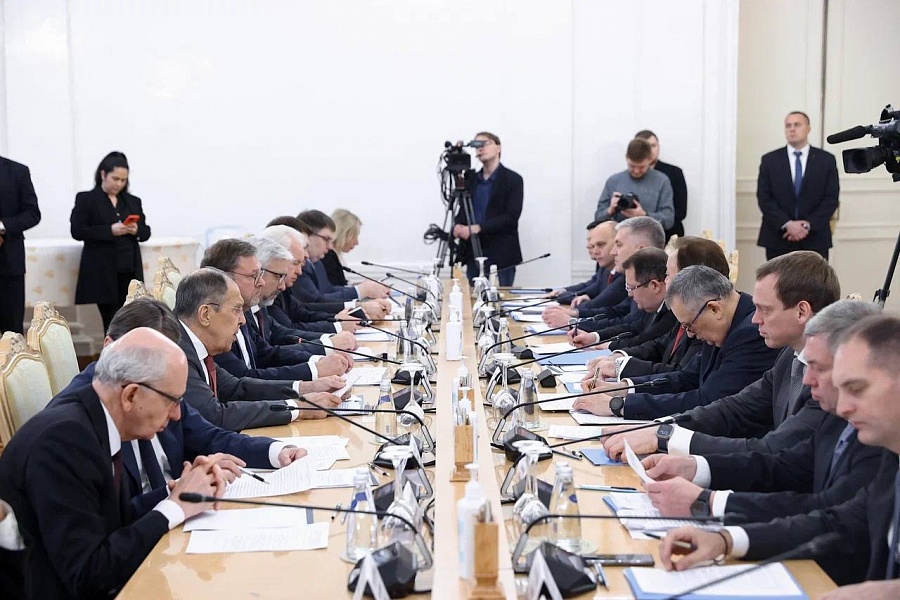Foreign Minister Sergey Lavrov’s remarks at the 41st meeting of the Council of the Heads of Constituent Entities of the Russian Federation at the Ministry of Foreign Affairs, Moscow, November 20, 2023
Colleagues,
I am happy to welcome you to the 41st meeting of the Council of the Heads of Constituent Entities of the
At our previous meeting, we discussed a range of issues related to advancing the interaction between our regions and the Central Asian countries. We set priorities and outlined practical steps, primarily in order to impart additional dynamics to cooperation between the regions. We have noted that you have undertaken major efforts to implement the long-term recommendations issued following the last council meeting. Our Central Asian partners are equally committed to promoting exchanges and specific forms of cooperation at the regional level.
Today, we will focus on International Cultural and Humanitarian Cooperation with the Constituent Entities of the
International cultural events such as festivals, competitions, and tours by performing artists that are regularly hosted by
I won't go into detail about the topics that were discussed, but most importantly we are for culture remaining outside any political processes, conflicts, or crises. It should know no boundaries. We are ready to develop cooperation in this sphere with all countries, especially those whose leaders support promoting contacts in this area, but we are not closing the door to cultural and artistic figures from the countries that are currently led by unfriendly governments.
It is important to pursue
We are interested in seeing the number of foreign students studying at Russian universities grow. Favourable conditions are being created to this end. We would like to encourage regional education institutions to maintain ties with their graduates, and to facilitate the creation and functioning of associations of graduates from Russian and Soviet universities in foreign countries. Positive experience is available, and we will continue to build on it.
We are interested in promoting the status of the Russian language, especially in the countries that border
International relations in sports, youth exchanges, and the volunteer movement deserve special mention. We see good prospects for creating theme-based camps in the constituent entities of the Federation, and bringing in young people from foreign countries.
You are aware of our focus on tourism. We want foreign tourists to increasingly see
We note the growing level of interaction between regions and Rossotrudnichestvo, primarily considering the use of the infrastructure of Russian centres of science and culture abroad. We welcome the initiatives of the regions for this. We will support them as best we can.
As Chairman of the Commission of the
Many regions actively utilise UNESCO's expertise in promoting their development, and in enhancing their tourism and investment appeal. Examples abound. I will only mention the inclusion of
Yakutia and Yugra are active in the field of multilingualism, including as part of the International Decade of Indigenous Languages. This allows them to conduct representative international events even amid these challenging circumstances.
The cultural potential of the regions can and should be used to strengthen cooperation within new types of multilateral associations involving
As for contacts between regions and representatives of the Western countries, I have already mentioned that we are open to the participation of their cultural and artistic figures and ready to collaborate with their youth and sports circles. Of course, such cooperation should be free of politics.
The Foreign Ministry will make every effort to ensure that this comes to pass and that these activities take place solely within a humanitarian context. Many people in Europe and the
Over the past year, cooperation between the constituent entities of the Federation and countries such as
I believe cultural diplomacy at the regional level should reach a whole new level in the interest of strengthening the high standing of our country and shaping its objective image abroad. This work requires concentration and adaptation to changing realities.
The Foreign Ministry will approach cooperation with our colleagues in this particular way. In order to enhance the effectiveness of our cultural and humanitarian policy and to improve coordination in this area, a new Foreign Ministry unit, the Department for Multilateral Humanitarian Cooperation and Cultural Relations, was created earlier this year. Its staff will provide information, advice and practical assistance to all constituent entities of the Federation. I encourage everyone to join this collaborative effort.




